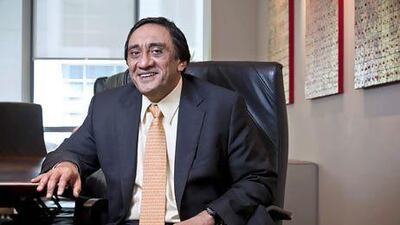The answer is surprisingly in the negative when you ask Phupinder Gill, the chief executive of the Chicago Mercantile Exchange (CME), whether he likes the Dubai International Financial Centre.
"No," says the head of the world's biggest commodities and futures exchange. "I meant I love the DIFC. It engenders an environment friendly to international business participation, and has a system of rule of law similar to London or Singapore. It's a fantastic free zone."
The CME boss had visited Dubai before, on a holiday visit, but his most recent trip was strictly business, as part of a tour of the CME's global interests and to check up on the progress of one of those, the Dubai Mercantile Exchange (DME).
CME has a 50 per cent stake in DME and is backing the Dubai exchange's ambition to become an oil trading centre to rival the great markets of the United States and Europe, using the local Oman contract as a benchmark alongside West Texas intermediate (WTI) and Brent crude, the two benchmarks that dominate global oil trading.
"DME is one of the investments we're very excited about. We reinvested recently, and we're very excited about what we've seen in the last eight months or so," Mr Gill says.
CME's increased equity involvement in DME coincided more or less with the appointment of Chris Fix as DME chief executive last year, and progress under Mr Fix has obviously pleased Mr Gill. "He's building a client base that's phenomenal," says the CME chief.
In the past eight months, business on the DME has surged from 3.5 million barrels of oil a day to 9 million. Last February, the DME announced it had passed the landmark of 4 billion barrels traded since it began in 2007.
DME's progress comes at a time of change in long-established patterns of global oil trading, partly under the influence of the US shale boom, and partly because of greater Asian demand for Arabian Gulf oil.
One of the results has been the ending of three decades of supremacy for WTI as the benchmark contract in financial markets, and its replacement by Brent.
CME, as operator of the two markets in New York and London where most of those trades take place, is at the heart of this transformation. But can the DME, which is still dwarfed by the others in terms of trading size, seriously hope to break into the market?
"I think it's extremely realistic to put it on a par with the others. It may take a while, it took us five years to get our Eurodollar contract accepted as a benchmark. But we're working closely with London and Singapore and allowing DME to get all the benefits of the CME grouping.
"We make alliances with other exchanges, but none is as significant as with DME. We want to make it the benchmark for east-of-Suez trade flows," he says.
He believes customers can extract some significant advantages by doing business with CME. "We are the only exchange that lists the three benchmark contracts, and this has significant margin effects for traders. They're all cleared in the same place, and this helps ensure maximum capital efficiency," he emphasises.
In the early days, the grand strategy for DME was to try to persuade the Gulf region's biggest oil producer, Saudi Arabia, to use DME as its main market. Efforts to do so met indifference from Saudi Arabia, which preferred the traditional set-up.
So under Mr Fix, and endorsed by Mr Gill, DME strategy has changed to a two-pronged focus: on the big oil markets in Asia and on attracting financial players - the hedge funds and brokers - to use DME.
The potential in each is enormous. The Asian appetite for oil is still huge, despite slight downturns in rates of growth in China, and especially India. Much of DME's effort is concentrated on developing business with the big consumers, producers and refiners to the East.
Financial trade is also potentially lucrative. The figures show that 80 per cent of the business done in West Texas is by financial players, but these make up only 9 per cent of current DME business.
DME has recently added new financial partners to its trading list, including US commodity funds, Swiss investment funds and ADS Securities, the Abu Dhabi-based brokerage.
Mr Gill would welcome partnerships with other Dubai organisations, but points out that the Dubai Mult-Commodities Centre, the emirate's local commodities exchange, is more focused on the retail trade and falls under a different regulator to DIFC-based DME. "Our customers are very corporate and financial and we have no retail clients in DME," he says.
Nor is he deterred by the Gulf region's reputation for volatility. "What's important for us is that the regulator and political environment has to be stable, and Dubai is appropriate for us in that respect. No matter what happens in Korea or with the Arab Spring, we're pretty comfortable round the world."

